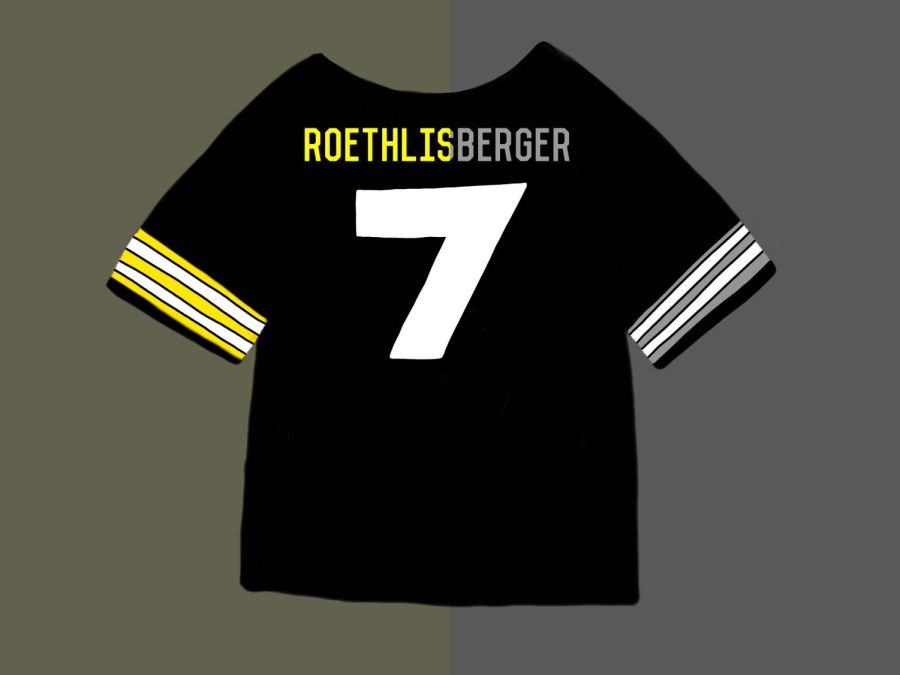The Complicated Legacy of Ben Roethlisberger
Ben Roethlisberger is one of the most polarizing figures in sports — a proven winner on the field, and an alleged sexual predator off of it.
January 19, 2022
Disclaimer: The following article includes descriptions of sexual assault.
Ben Roethlisberger has not officially announced his retirement yet.
However, all signs are pointing to this season being his last with the Pittsburgh Steelers, capping off an illustrious career in the Steel City that spanned 18 seasons.
Drafted in 2004 and nicknamed “Big Ben,” Roethlisberger led the Steelers to two Super Bowl wins and five conference championship appearances. His 64,088 career passing yards and 418 career touchdowns both rank among the National Football League’s top 10 all-time among quarterbacks. He has stayed with Pittsburgh his entire career, has been hailed as a wonderful leader, and received much of the credit for their two rings in that time.
And he also has had two sexual assault cases.
Roethlisberger entered the league in 2004 out of the University of Miami of Ohio. He immediately set the rookie win record, going 13-3 in his first year with the Steelers. His career has shown him to be a proven winner and established him as the best quarterback in a class that included accomplished players such as Eli Manning and Phillip Rivers.
But two events in his career have provided the ultimate litmus test for what prominent quarterbacks can get away with.
His first sexual assault charge came in 2009, one year after its alleged occurrence in 2008. Andrea McNulty, an employee at a Lake Tahoe hotel, said that Roethlisberger called her up to his hotel room, claiming that he was having trouble with his television. When she came into his room to fix his TV, McNulty attested that he raped her, and said that she suffered from various mental health problems well after the incident occurred.
The case was settled out of court in 2012.
Roethlisberger did not face any penalties or investigation from the league.
In 2010, just one year after his first allegation of rape, Roethlisberger again faced another accusation of rape. This time, it was a 20-year-old student who claimed that he raped her in a nightclub bathroom stall. The case was eventually dropped due to a lack of evidence. Roethlisberger was suspended for four games — the same penalty that players face for substance abuse, and the same penalty that Tom Brady faced for the infamous ”deflategate” debacle.
Think about this for a second: Players who are caught smoking marijuana are given the same punishment as Ben Roethlisberger did for allegedly raping two women.
And these allegations have been largely forgotten about. His endorsements have stayed largely intact since his allegations — save for a beef jerky endorsement that he lost. His actions were even dismissed as “immature” and nothing more by the Monday Night Football crew during his last game.
Back in 2014, Ravens running back Ray Rice was indefinitely suspended for knocking out his girlfriend in an elevator. This incident essentially ended his career, as the Ravens rightfully released him. Roethlisberger allegedly committed an arguably worse crime and, in a perfect world, should have received a comparable suspension.
Unfortunately, this is the NFL, where highly paid quarterbacks can get away with a lot. Simply put, the quarterback is the most important player on the field, and there are only so many talented arms in the league. Roethlisberger was one of the best.
That doesn’t mean he should have been able to come out of it unscathed — but he mostly did.
Ultimately, “Big Ben” is one of the greatest quarterbacks and winners to ever play in the NFL. He deserves to make the Hall of Fame as a player, and he likely will.
But his legacy is forever tainted by the events from 2008-2010 — even if some want them erased from memory.





